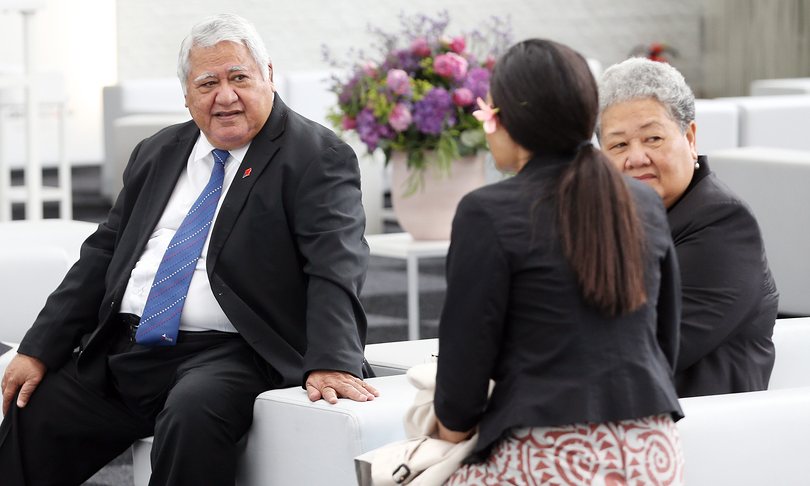
Photograph: European Development Days
The prime minister of Samoa has defended his country’s role as an offshore tax haven, claiming it provides revenue for social programmes for young people who might otherwise be exposed to illegal drugs.
During a visit to Brussels, prime minister Tuilaepa Aiono Sailele Malielegaoi suggested the ravages of climate change on his Pacific island nation are making it increasingly reliant on the royalty payments from trustee companies such as Mossack Fonseca, which is at the centre of the Panama Papers.
“The Samoa International Finance Authority [Sifa] – which registers companies that do not actually come to Samoa – is very important for financing our youth at sport,” said Malielegaoi, 72. “On top of the increase in the force and frequency of storms, we have a new problem of drugs coming in on boats through our customs.”
The Panama Papers revealed Samoa, which is situated halfway between New Zealand and Hawaii, as a key player in offshore financing. The leaked documents showed that law firm Mossack Fonseca had created more than 5,000 companies in Samoa on behalf of its clients. Malielegaoi has denied any wrongdoing by Sifa, the products and prices of which are published online. He said Sifa’s operations are legal and regulated, and that Samoa is a signatory to “three or four” anti-money laundering protocols.
The jerseys of the national rugby team are emblazoned with “sifa.ws”, the Sifa website address, and Malielegaoi said national pride was at stake. “Without Sifa, we could not finance our participation in the Rugby World Cup.”
Malielegaoi, who has been prime minister since 1998, was in Brussels to receive a €20.2m EU subsidy to be spent mainly on providing sanitation and clean water for the Samoa’s population of 200,000 people. Residents survive mainly on fishing and the remittances of the 300,000-strong diaspora in New Zealand, Australia and the US.
He used his speech to donors and aid organisations attending the European Development Days to call for an “upgraded responsiveness” to the needs of small island developing states in the face of climate change.
“We are often told our projects are too small to be funded. Other times we are blocked by burdensome application and reporting requirements,” he said, adding that economic opportunities are narrowing for countries like Samoa. “Fisheries and tourism have provided an important development pathway for some, but climate change is rendering these sectors much more vulnerable. One of the worst coral bleaching episodes is currently damaging our reefs, destroying traditional sources of food supply.”
Samoa also faces problems of time and place. It is on GMT+13, which means it is 12 hours ahead of London and 18 hours ahead of Washington. The country is 3,300km from Wellington, New Zealand, and one hour ahead of it. Before leaving for the capital, Apia, on a 30-hour flight home – via London, Los Angeles and Wellington – Malielegaoi said one of his main achievements as prime minister had been Samoa’s 2011 move west of the international dateline.
“Our business and cultural transactions are with our people in Australia and New Zealand. Before the change we were terribly handicapped,” he said. “We were 21 hours behind Sydney. If we were suddenly informed, on a Friday, of an upcoming event in New Zealand or Australia, we had already lost a day, and it was the weekend. Now we have a better compromise. It also helps business.”
Two years earlier, Samoans switched to driving on the left. “This was to bring us into line with Australia and New Zealand, so that our children can send us cars,” said the prime minister.
But climate has always been the decider of Samoa’s fate. A brief look at @DMO_Samoa on Twitter reveals the ordinariness of washed-away roads, tsunami threats, earthquake reports, power outages and floods.
“Intervention from the Lord above”, is Malielegaoi’s only explanation for why small island states have not already been wiped off the world map. He cites the 2009 cyclone that battered Samoa with 20ft waves, caused $400m (£301m) of damage and delayed the country’s “graduation to middle-income country” until 2014.
“If that had happened in [low-lying] Kiribati or Tuvalu, there would not have been a single survivor. We heard of the 300mph typhoon [Haiyan] that hit the Philippines [in 2013]. If that happened to any of our small island countries, the infrastructure would be flattened and the agriculture – trees and crops – destroyed. What is worrying is that we already know that it is going to get worse: stronger winds and more often.”
- Alex Duval Smith attended the European Development Days in Brussels with funding from the EU

